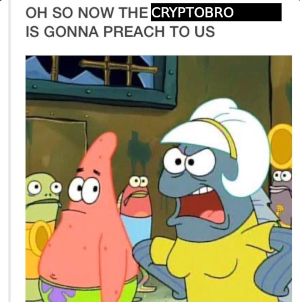Is because communists seek consensus, not just majority.
Voting in liberalism (the ideology of capitalism) is like everything else you experience in capitalism; it’s alienating and alienated.
We’ll focus on the alienated part. The liberal vote goes like this: here’s the question, you can answer yes or no, knock yourself out.
They don’t care about anything else. They don’t care if you’re educated or not about the question, or the reasons you might have to be voting one way or the other. All they care about is the box checked on the ballot, and then whichever option gets the most votes, even if it’s one single extra vote, wins.
The communist vote goes like that: here’s the question, why do you want to vote yes or no?
We build consensus. Build is the keyword here: consensus is not reached by random luck or letting enough time pass, it’s a conscious effort that you have to make.
We educate people about the question and their choices, we try to understand why they lean one way or the other, and then we talk with them to give them all the facts they need to make an informed decision.
It’s something we naturally started doing on ProleWiki, we try to reach a consensus for most decisions (the most common ones being account requests). If someone votes no, we want to know their arguments for it, and that’s why most account requests end up with a pure 9-0 result or similar; we talk and convince people to reach one decision or the other. We motivate our own decisions as well; whether you vote yes or no, you’re encouraged to explain why – votes are not yet anonymous in our case.
But there is debate happening, which is healthy and helps reach a better solution.
It’s also what Cuba did for their new constitution. The way these votes happen in liberal democracies is, again, they give you the question, they give you the changes that would happen, and they ask you yes or no and that’s it. The way Cuba did it was to first talk with communities and their citizens, before any vote even took place. Then they refined a proposal based on these discussions, submit drafts for auditing by the population, and then finally the vote happened.
Yeah, this is another thing that liberals struggle to wrap their heads around.
Also it’s not just about building consensus, it’s about arriving at a compromise.
Take a situation where 52% of the country says “Let’s do plan X because it would benefit us in many ways”, and 48% says “if you do X that will harm us, we want to continue current implementation Y”:
Liberal democracies divide the nation over the issue and attach X and Y to parties A and B. Then you vote for A or B, and whoever wins gets to have their way and whoever loses gets a big fat bowl of “too bad, so sad.” The result? A nation divided, compatriots wishing death upon one another, partisan private media dehumanizing ‘the opposition,’ and oftentimes actual harm done to some of your people.
It gets to the point where it isn’t just about getting things your way, but people in your nation take actual pleasure in seeing other groups in their nation denied. This 👏 is 👏 by 👏 design. A brave and noble land of “Fuck you, got mine,” divided and easily ruled.
In whole-process democracy, taking an action that leaves 48% of your people completely disenfranchised (or even harmed) is completely unacceptable. It’s unacceptable to the 48%, it’s unacceptable to the government, and if it’s not also unacceptable to the 52% then you’ve failed to educate them. Instead of exacerbating any decision, a group like the National People’s Congress either tackles the issue directly or forms a committee for it. Instead of going straight to a vote they ask questions like “How is X harmful? Can we make it not harmful?” They’ll either synthesize a new plan Z at best or they’ll not change anything at worse. And then there’s a vote.
Everyone involved knows that genuine effort has been made, consulting with the best expertise the nation has available, to create plan Z. Citizens know that if they’re asked to compromise, whatever they’re asked to give up is giving to their compatriots more than it’s taking from them. If a proposal polls at a 60-40 split that doesn’t mean you push it through, it means you go back and find out how to bring more of that 40 on side. The vote is an official record of consensus; a formality in a successful and functioning government and a constitutional protection in one that has failed and become disunited.
No sentient, compassion-capable mind would choose the immediate line in the sand over the process of consensus. But that’s how fucked Western culture is, that protagonist, antagonist, conflict is seen as a better expression of government for and by the people than thesis, antithesis, synthesis.
Bonus points if a ruling majority party has less than 50% of the populations votes and voter participation is super low so you effectively get 30% (if you’re lucky) of the population making decisions for the rest.
I hate liberal democracy. Long live democratic centralism!
deleted by creator
Actually the government response is extremely agile if it wants to be, but it absolutely will not rush social change because you literally can’t. All political power is vested in the National People’s Congress, and the NPC reflects the will of the people. The NPC or any organ of government it delegates power to serves the will of the people and that means it can’t tell the people to change their will. It can only influence through education.
But their response to COVID-19 shows how quick the government can be at responding to emergent situations. In a matter of days they were establishing quarantine rules and regularly refining them as their understanding improved, in a matter of weeks they were producing surgical masks and PPE in such vast quantities that they were exporting some, in a matter of months they had designed quarantine centers that could be built and in service in a few days.
Why are libs downvoting shit in c/communism? Absolutely deranged behavior
it’s the “i’m almost enjoying my anger!” mood, the deliberate exposure to things you don’t like for the catharsis and/or sense of superiority that’s not unique to internet libs, see also ‘shit X says’ communities that exist everywhere under the sun.
…and liberals once again thinking their votes matter 😎
Libs don’t wanna learn anything they think they know how the world works already
The liberal vote goes like this: here’s the question, you can answer yes or no, knock yourself out.
And that’s the ideal of liberal democracy. In real one you get one referendum per decades and the rest of the time you only get to check one or more boxes on the card which may or may not have any impact over who will be the middlemen between the value stolen from you and people stealing it. And all of the above could as well get just ignored if it went not as the latter people wanted, then it’s coups, martial laws, invasions etc.
In contrast with liberal “democracies” we can see how they treat referendums as this random thing done with a year or two of preparation, and that whatever is the outcome is the will of
Godthe people, which is immutable and can only be tested once in a generation, so long as they benefit the ruling class. Brexit got voted for, therefore it must happen no matter what, but the indyref didn’t get the 50% so better wait until all Scots die of old age. And when the result of the referendum goes overwhelmingly against the ruling class interest, like in Donetsk/Luhansk or even in Catalunya, then it must’ve been stuffed ballots, and it was illegal, and no we won’t redo the referendum to test that hypothesis.and that whatever is the outcome is the will of Godthe people, which is immutable and can only be tested once in a generation
Ha, it’s even more insidious. If you get your way, it’s the will of the people, don’t you dare question it. If you don’t get your way, well, the people just aren’t ready and you get to try again next year until they finally agree with you (or you’ve worn them down enough that they’ll vote for your proposal)
Or they slightly rephrase the question to pretend the vote is about something else.
Consensus decision making is baller as hell. We’ve been using it in our commune for about 3 years now and have noticed massive improvements across the board.
As well, the end result of the “yes or no” answer style “democracy” is that you’re given two options and have to choose between those options.
Nice to hear you trying out some democratic centralism on ProleWiki. Would you say it’s smooth? If it is ever 9:1, does the 1 ever convince everyone else?
I watched an interview with Roland Boer where he talks about democratic centralism: https://www.youtube.com/watch?v=tjHNn31Vwt0 Interesting stuff. He explains one of the flaws of the USSR was the belief that DC must be implemented within the party but cannot, for whatever reason, be implemented more widely. China, however, has tried to do both.
Boer talks about the consultation process built in to the socialist rule of law. Whereas liberal democracies do as you describe, laws only make it near the rolls after a long DC consultation process. Thousands, perhaps hundreds of thousands of people contribute millions of characters to a discussion about what the law should be. Only then can an idea for a law be enacted. As you say, there’s no question of ‘voting no’ because all the disagreement has substantially been resolved. Similar with appointments, I believe. While liberal democracy involves the people (demos) in the choice, socialist democracy involves the people in the process, from the beginning. When it comes to voting, it’s less of a choice and more of a confirmation that the process has achieved what it was supposed to achieve.
If it is ever 9:1, does the 1 ever convince everyone else?
We’re generally all in agreement one way or the other and it’s very rare to have more than 2 votes the other way. Only time we’ve cut it very close (something like 5-4) the administration pulled their right of veto and explained why we felt that prospective editor would not be a good fit yet, but should try again in a few months.
If we’re in such a situation, we ask the minority why they voted the way they did before we grant the account, but usually it all goes pretty smoothly although there is a lot of discussion around most account requests; we take them seriously and it can take up to two weeks to get your account approved. But at the end of the day most everyone votes, even if they sometimes need a reminder lol
Similar with appointments, I believe
Yeah, the Soviets also did that. By the time you had to vote to confirm Stalin as Chair of the CPSU for example, it had been pretty well debated who should be on the ballot (Chair was voted on by the central committee, so a smallish section). It was really just to confirm and make it official because by that point, they had talked about all their options – it wasn’t a thing where you would announce yourself as a candidate or someone would announce you, they would essentially pick you to be a candidate and there was only one candidate because all others had been rejected before the official vote.
It’s also how most small NGOs and other orgs work, but funnily enough libs don’t have a problem with that method when it happens in those.
There’s also a different case that happened where at the lower levels, they would elect people not by approval but by disapproval. Citizens would register someone they knew on the ballot (you couldn’t register yourself, it’s still the case in Cuba that 2 people need to register you in elections), and the vote was not about who to elect, but who not to elect. They’d remove candidates like this round after round until there was only one left. If the last candidate was also rejected, they would start the process over again.
And of course instant recallability if the elected officials failed to perform their tasks.
I like punch yourself analogy because we go further into how they get people to then vote to punch themselves. It’s less so “punch yourself” and it’s just you voting, it’s more like “punch your neighbor” and it’s the whole neighborhood voting. To go further it’s “punch someone in another neighborhood” and it’s the whole county voting. Growing up to state and then national. They don’t point out that if every votes to punch someone else, you also get punched, because in liberal voting, it’s all about you, you, and you, not the collective, never the collective.
ProleWiki is a very interesting movement, and for documentation purposes I hope to see more of it. For brevity though, could you link an example of a similar vote that you described in the OP?
Another aspect is that in general, liberalist states vote for people and parties, and even most referendums and policies are usually coded to side with one party or the other. In America this usually boils down to: tax goes up -> democrats, tax goes down -> republicans, or it’s related to some political hot topic that has already been nationally polarized by the news.
I don’t think it’s really said enough, but there is a fundamental problem with republic democracy, in that when you’re voting for people and not for ideas, the only winning metric is how ‘convincing’ they are. This inevitably leads to a certain type of person getting an edge, and honesty is usually detrimental to their success. People generally know this, but when 50% is all you need to clear, then that’s all you’re gonna care about. Policy and ideology get moved further and further away until they’re boiled down to talking points that can rile up a base, and now you got yourself another corrupt country.
Democracy definitely works in small groups or settings where good faith debate can take place with a reasonably educated and inclusive group, but outside of that, it has problems. I think people are conditioned even more-so than capitalism to believe that democracy is a golden ideal to achieve, but the shortcomings are pretty blatant when you stop to look at it. Better than authoritarianism, sure, but once personality is thrown into the mixture, that’s what you’ll end up with anyway.
You’re fucking delusional if you think communists don’t silence dissent once in power. I’ll prove it to you, right now.
99% votes are the result of intimidation.
Communists do repress some types of dissent once in power (as capitalists also do). But you know what? Fascists shouldn’t get to vote. I don’t give a damn what a climate change denier thinks about energy policy. Some car dealer wants to hack away at worker protections? Don’t care.
“But is there free speech for the fascists?” is not actually a measure of good governance.
deleted by creator
Now you can’t just walk onto someone else’s federation, be confidently wrong/ignorant/crackerish, and then use the resultant dogpile as “SEE! SEE! I’M BEING SILENCED! I’M BEING SUPPRESSED!” There was literally a Monty Python bit about your kind of punkassed sealionry.
I’m not on someone else’s federation, I’m on everyone’s federation.
You’re not on this one anymore ayylmao
Don’t you see? By not tolerating this guy’s asshattery, you’ve proved that communism doesn’t work!
I don’t know how exactly, or why “not tolerating people flinging shit everywhere” is a mark against communism, but it is somehow. Gommunism destroyed.
but it is somehow
It supposedly proves that communists only achieve consensus by suppressing bad-faith dissidents
deleted by creator
That’s all the libs have really, childish insults and “nu-uh” or “I know you are but what am I?”
what they don’t understand is that we won’t tolerate their childishness. They might be able to argue with a conservative that way (because they’re both still liberals), but not with a Marxist.
deleted by creator
To silence dissent there must be actual criticism. Your weirdo comment is only a troll, it has no substance or goal beyond “dare you to ban me”. Therefore banning you is not silencing dissent, it’s more akin to taking out the trash.
And we all want to live in clean spaces.
Lol what a fucking nut job… As if liberals don’t silence opponents.
You know how many instances have “people from lemmygrad better watch your shit” posted in their wiki? Yeah fuck you, you silence us all the fucking time.
Coming from a fucking crypto grifter too. Pathetic.

“Ha! You restaurant claims to allow service for anyone, yet you have a sign that says you can refuse service to anyone! And I just took a big shit on the floor and you’re asking me to leave! I’ve proven my point that you’re all hypocrites!”
really just said “nuh uh” 😭 how did you stumble into lemmygrad
I’ll prove it to you, that you don’t know what you’re talking about right now: Source?
I’d like to see some of these sources for this claim
Write some paragraphs explaining your case. The length about the same as @CriticalResist8 . No, half would do, or even a third, with extra points for sources. Then your post would be taken more seriously.
Aha, I’ve made the analogy to how libs react to communist ideas with creationist style rhetoric before. Good to see I’m not the only one who noticed this.















